Shopify vs GoDaddy: Which Should You Use?

Shopify and GoDaddy are two notable names in the e-commerce platform landscape. Shopify specializes in creating comprehensive e-commerce solutions, whereas GoDaddy, known primarily for domain registration and web hosting, has diversified into the e-commerce space. Each platform offers a unique blend of features suitable for different business needs.
In this article, we will offer a detailed comparison of Shopify and GoDaddy, focusing on crucial aspects like pricing, performance, and usability. Our aim is to provide you with a comprehensive overview to help you choose the right platform for your online business.
Before going into the details, make sure you have build an eCommerce store on Shopify!
What is Shopify?
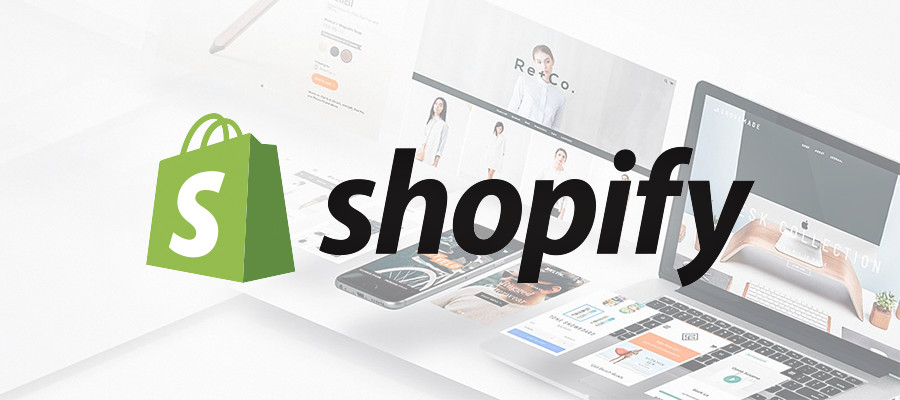
Shopify is a leading e-commerce platform designed to help people build their own, scalable online store with hundreds of built-in features and tons of apps. You can sell products directly on your website, across multiple marketplaces and social media.
Founded in 2006, Shopify focuses entirely on helping entrepreneurs create online stores. It offers a variety of tools for businesses to sell products and track inventory, making it a popular choice for businesses of all sizes. Whether you're selling handmade artisanal soaps from your kitchen or running a nationwide clothing chain, Shopify has the tools to help.
What is GoDaddy?

GoDaddy is a powerhouse in the web hosting service world and the world's largest domain registrar. Established in 1997, GoDaddy has since expanded to provide a whole suite of business services, including email hosting, security features, and - yes, you guessed it - e-commerce solutions.
GoDaddy's e-commerce platform, GoDaddy Online Store, is a part of GoDaddy's larger suite of website-building tools. The platform allows users to create an online store and add it to an existing website, or build an e-commerce site from scratch. It's tailored for small businesses looking for a simple, convenient way to quickly establish an online retail presence.
Differences between Shopify and GoDaddy
1. Pricing
* Shopify Pricing:
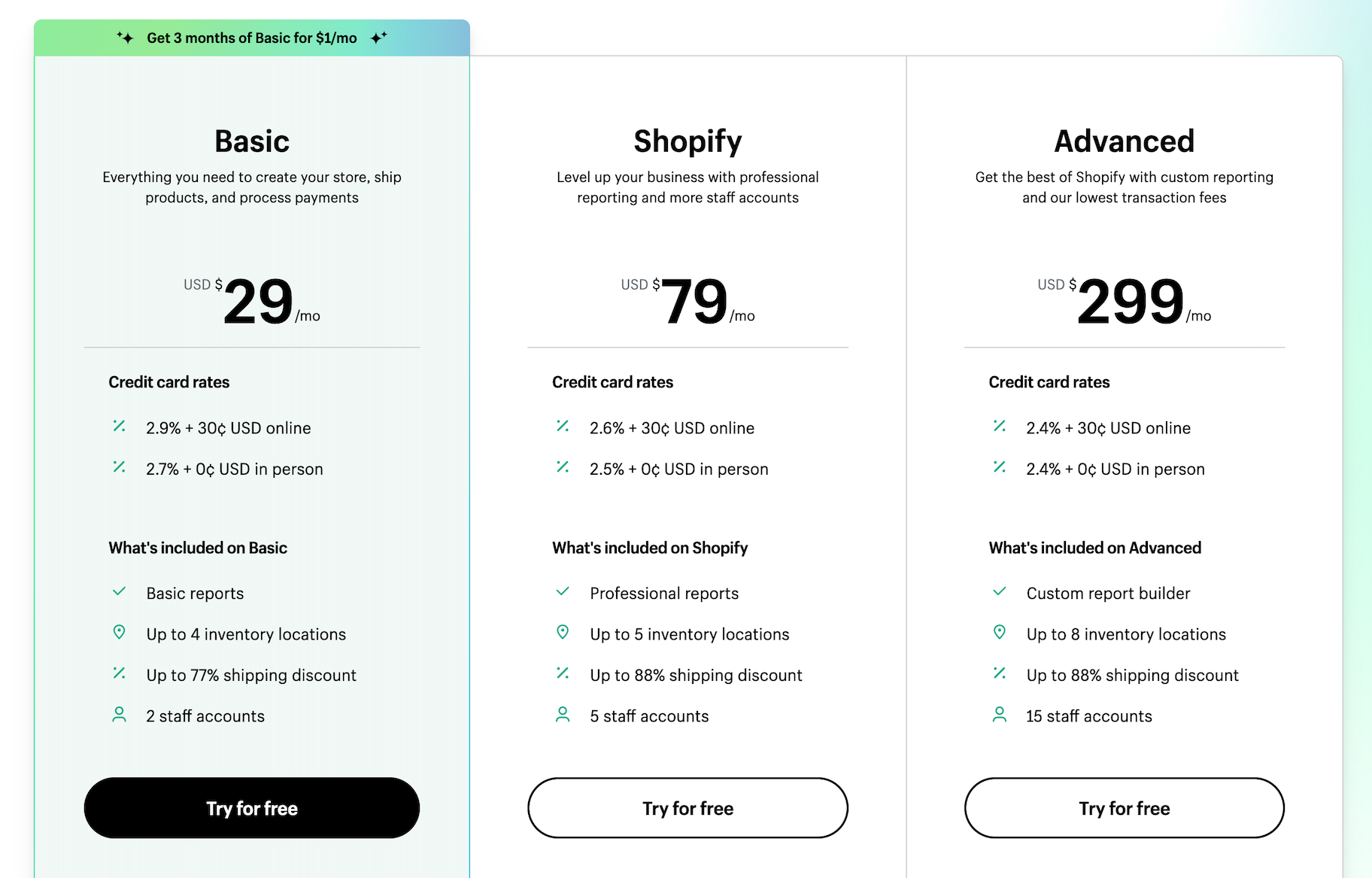
Shopify's pricing structure leans towards the pricier side when compared to other platforms. It offers three core plans:
- Basic Shopify – $39/month: The Basic Shopify plan starts off with a tantalizing offer of just $1/month for the first three months, making it an ideal choice for those who are just launching their Shopify store. After this period, the price reverts to $39/month starting from the fourth month onwards.
- Shopify – $105/month: This mid-tier plan equips you with everything required to expand your business, including all features present in the Basic plan. Moreover, it provides more sophisticated sales and reporting tools, as well as global selling support, among other things.
- Advanced Shopify – $399/month: This plan brings to the table advanced features tailored to the needs of medium-to-large businesses poised for rapid growth.
Merchants can rest assured that they'll find all the essential features they need for a successful e-commerce business encompassed within the Basic, Shopify, and Advanced plans.
However, larger e-commerce enterprises might find a better match in the Shopify Plus plan. Catering to corporate users, this plan comes with heightened security measures, API and CRM integration capabilities. You can also keep an eye on various sources for Shopify price predictions to anticipate future costs.
* GoDaddy Pricing:
GoDaddy structures its services into four distinct pricing plans, each tailored to cater to a specific range of requirements:
- Basic - $6.99/month: this plan offers fundamental features that are perfect for individual users looking to build a personal website or blog. It's a good starting point for those stepping into the world of online presence.
- Standard - $10.49/month: this plan serves as a launching pad for fledgling businesses. It includes tools and features aimed at small-scale commercial activities, enabling new entrepreneurs to establish their businesses online.
- Premium – $13.99/month: the Premium plan is intended to help expanding businesses thrive in the digital space. It provides advanced features to manage larger-scale operations, making it a suitable choice for businesses in the growth phase.
- eCommerce – $14.99/month: the eCommerce plan equips users with all the tools needed to set up and manage a comprehensive online store.
It's worth noting that while the eCommerce plan is the only one that facilitates the creation of a full-scale, standalone online store, the other plans still provide some eCommerce capabilities.
The Premium plan can be particularly useful for businesses that provide intangible services such as consulting or online classes. Furthermore, all GoDaddy paid plans come with the feature to accept in-person payments or issue payment requests, expanding your business' payment options.
However, it's important to underline that the option to present an actual product catalog on your online store is exclusive to the $24.99 eCommerce plan. This gives you the power to create a full shopping experience for your customers, offering a wide array of products for them to browse and purchase.
2. Ease of Use
* Shopify:
Using Shopify is a breeze — it's as easy as signing up for a free trial with a few clicks. The platform has adopted a drag-and-drop interface, which streamlines the process of designing your online store. A plethora of visual guides is also available to assist you through the entire setup, from selecting themes to launching your store. This intuitive, user-friendly approach makes the process straightforward, even for absolute beginners.
However, while Shopify's user interface is relatively easy to navigate, it may not stand toe-to-toe with GoDaddy when it comes to absolute ease of use.
* GoDaddy:
GoDaddy has adopted a different approach to the creation of an e-commerce store. Utilizing Artificial Design Intelligence (ADI), GoDaddy promises a swift and smooth experience of building an entire eCommerce store in mere minutes. To achieve this, you're required to answer a series of questions about your business and the industry you're in. Following these responses, GoDaddy's ADI generates a ready-to-publish website tailored to your needs.
But this ease of use doesn't come without its trade-offs. When using ADI, GoDaddy might limit your creative freedom. This could potentially restrict the ability to infuse your brand's vision into your store. If you're seeking to create an online store that fully encapsulates your brand's identity and vision, Shopify emerges as the ideal candidate. Shopify provides a comprehensive toolkit, ensuring you have the means to tailor your online store to match your vision perfectly.
3. Performance
* Shopify Page Speed:
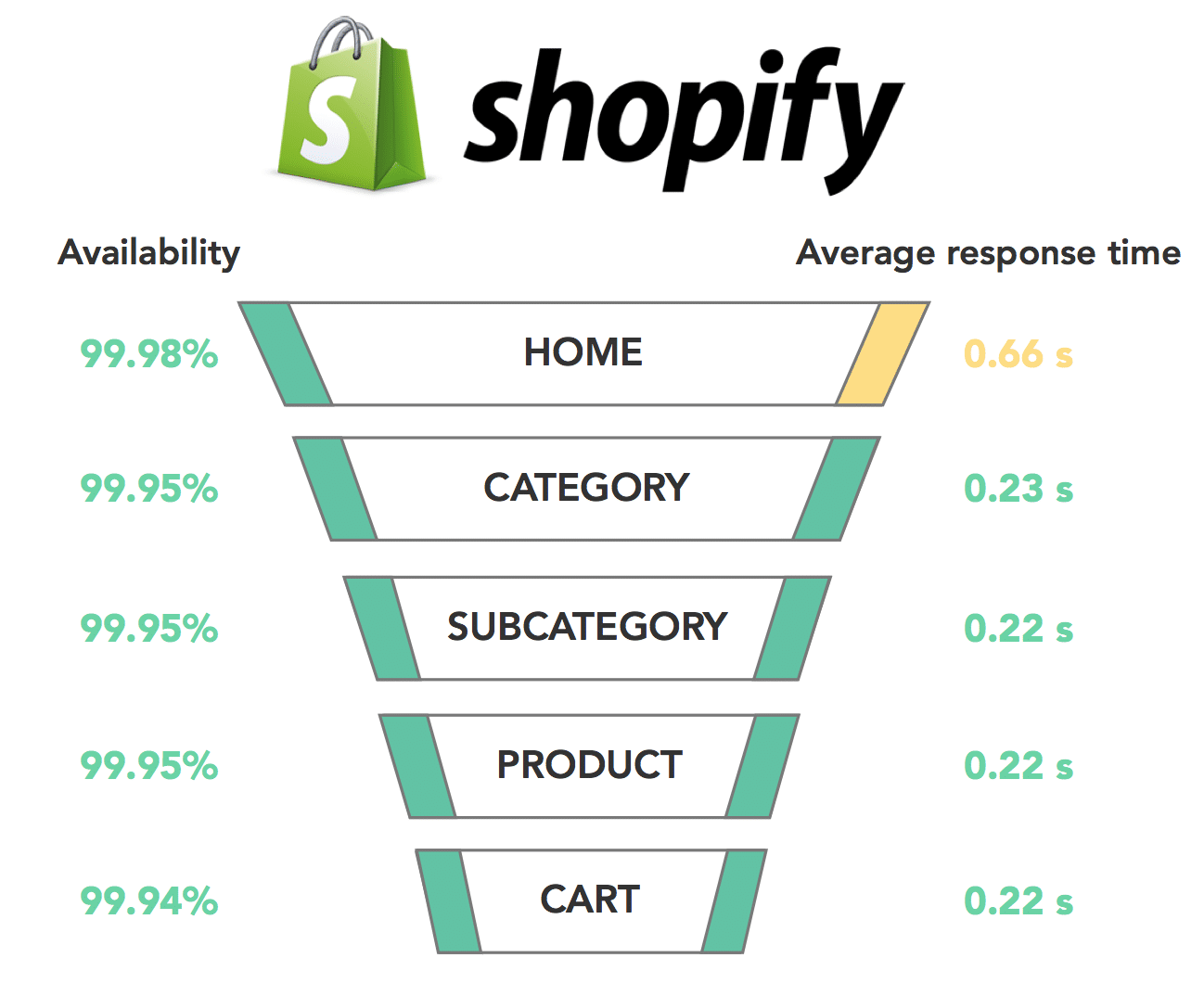
Shopify excels when it comes to page loading times, clocking in an impressive 309 milliseconds. This is significantly faster than Google's recommended loading time of 500 milliseconds, placing Shopify well above the industry standard. As a result, Shopify provides an outstanding user experience marked by rapid response times.
The performance of Shopify sites is consistently speedy, but with the strategic application of Shopify page speed optimization tactics, you can make it even more blazingly fast. It's important to recognize that superior site speed and page performance don't just improve the user experience (UX), they also boost your website's SEO. Ultimately, this leads to improved search engine rankings, which in turn can increase visibility and drive more traffic to your store.
* GoDaddy Page Speed:
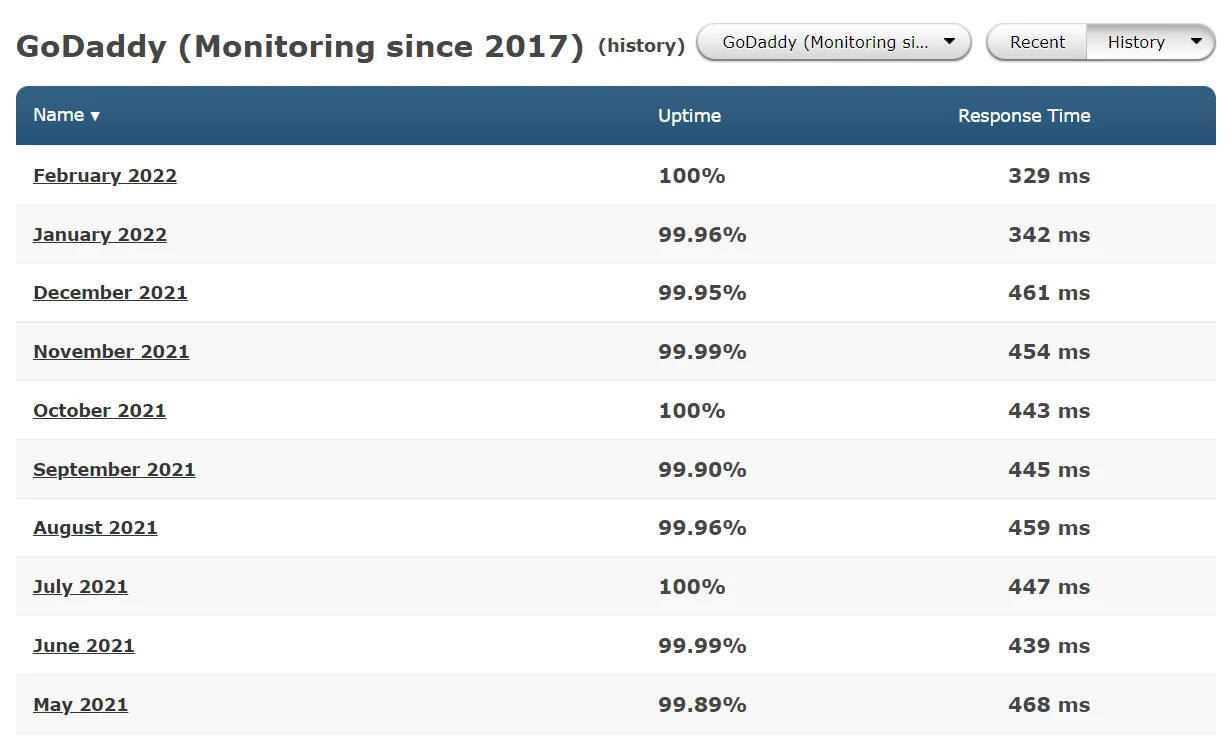
GoDaddy has a well-earned reputation for offering rapid page loading speeds. According to 2022 data, it clocked an impressive average load time of 292 ms, putting it ahead of other popular hosting providers. For instance, SiteGround had an average loading time of 384 ms, A2 Hosting at 295 ms, and Hostinger lagging slightly behind at 318 ms.
The importance of swift page loading times can't be overstated in today's digital landscape. A compelling study by Portent in 2022 established that a website that loads in just one second enjoys a conversion rate three times higher than a site taking five seconds or more to load. This highlights the critical role of load times in the overall user experience and the potential for revenue generation.
In light of this, GoDaddy's lightning-fast page loading speeds present a significant advantage for business websites and online stores. The faster the site, the more likely visitors are to stick around, improving the chances of converting these visitors into paying customers. It's a vital element to consider when choosing between GoDaddy and other platforms.
4. Themes and Design
* Shopify Themes and Design:
As a leading name in the eCommerce landscape, Shopify is home to a vast array of well-crafted themes. In fact, merchants can select from 105 distinct designs hosted on the Shopify Theme Store, with 11 of these available free of charge. This provides a multitude of aesthetic directions to align with your brand's identity.
To aid your selection process, we've compiled a comprehensive guide featuring the top 21 Shopify themes. This resource can help you find the ideal visual match for your store's needs.
Functionality isn't compromised for style in Shopify's themes either. Each theme includes features like product zoom, enhancing the shopping experience by allowing visitors to view products in finer detail. Coupled with the ever-present shopping cart icon, these attributes underscore Shopify's commitment to user-friendly design. Ultimately, these themes can be easily customized, enabling businesses to tailor the look and feel of their store to their specific needs.
* GoDaddy Themes and Design:
On the other hand, GoDaddy banks on its proprietary ADI (Artificial Design Intelligence) system to generate over 1,500 different types of industry-specific websites. Each industry catered to by GoDaddy has approximately 19 theme choices, providing a range of storefront styles.
However, it's important to note that once your site is created using GoDaddy's system, creative flexibility is somewhat limited. The available templates lean towards the basic side, providing functionality without a surplus of creative flourishes.
Regardless of these differences, both Shopify and GoDaddy feature mobile-responsive themes. This ensures your online store will adapt to fit any screen size, enabling a seamless shopping experience across all devices.
5. Apps
* Shopify Apps:
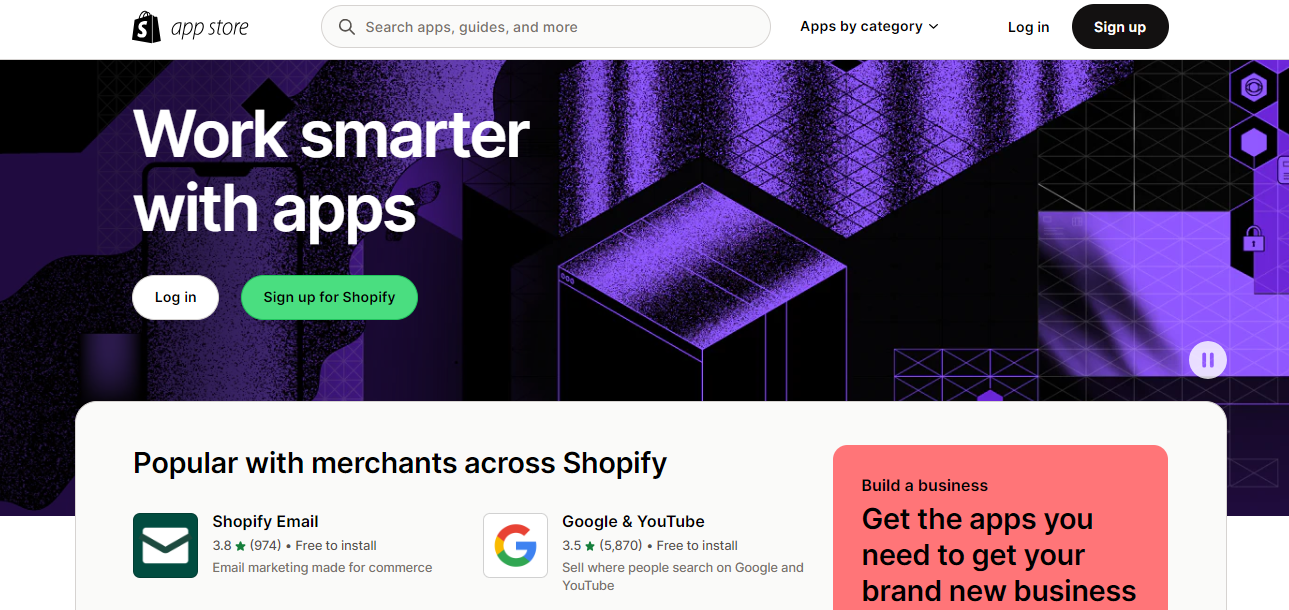
The Shopify App Store is a treasure trove of over 8,000 free and paid apps, all poised to elevate your store's functionality, simplify management tasks, and boost sales.
And it's not just for those with deep pockets! There are plenty of affordable, yet high-quality apps that can supercharge your online store. Take, for instance, the EComposer - a top-notch Shopify Landing Page Builder app that simplifies website creation, or Avada SEO, a powerful tool to amp up your search engine optimization efforts.
The wealth of applications available on Shopify's platform caters to a vast array of requirements, from enhancing customer engagement to optimizing backend operations. In essence, it's a virtual toolkit you can leverage to construct, develop, and flourish a thriving online store, even if you're working on a shoestring budget.
* GoDaddy Apps:
Unlike Shopify, GoDaddy does not have an integrated app store. This means that you're pretty much limited to the platform's inherent features and tools. Although it still has a lot to offer in terms of functionality, the absence of an app store can be a bit of a dampener for those looking for greater flexibility and customization.
6. Tools & Features
|
Features |
Shopify |
GoDaddy |
|
Inventory Management |
Comprehensive and straightforward inventory tracking. Can manage online and offline inventories. Supports integration with accounting software. |
Can sync with different online marketplaces (Amazon, Etsy, eBay, etc.) for inventory tracking. Supports the establishment and management of backorders. |
|
Payment Gateways |
Supports over 100 payment gateways including PayPal, Stripe, Amazon Pay, ApplePay, Cryptocurrency, and cash on delivery. Transaction fees applied if not using Shopify Payments. |
Accepts key payment options including PayPal, Stripe, Square, and Apple Pay through Stripe. No transaction fees applied for any payment method. |
|
Shipping |
Integrated with shipping carriers like USPS, DHL Express, UPS, and Canada Post. Allows in-house printing of shipping labels and tracking on-site. |
Can sync your store with UPS, USPS, Shippo, and DHL. Offers flat-rate shipping, weight-based postage, or free shipping, and in-store pickup for local customers. |
|
Omnichannel Selling |
Uses consumer data for seamless shopping experiences across platforms and touchpoints. Integrated POS solution for inventory, orders, and customer management. |
Allows content delivery to website and mobile devices. Lacks integration with a wide variety of devices and touchpoints preferred by online shoppers. |
|
Dropshipping |
No in-house tools but provides nearly 300 dropshipping integrations. Read more: 11 Best Shopify Apps For Dropshipping |
Doesn't provide any tools for dropshipping. Acceptance of orders and passing them to suppliers is possible but may be inconvenient. |
|
POD |
Supports Print on Demand (POD), one of the rapidly expanding innovations in eCommerce dropshipping. This allows for the customization and sale of white-label items on a per-order basis without the need for bulk buying or having inventory on hand. |
GoDaddy's support for POD services isn't explicitly mentioned. However, given its flexibility and integration with different sales platforms, it's possible to run a POD business on this platform with the right third-party tools. |
7. Marketing Capabilities
|
Marketing Features |
Shopify |
GoDaddy |
|
Email Marketing |
Offers a built-in tool known as Shopify Email |
Equipped with an integrated email marketing tool within eCommerce plans |
|
Blogging |
Includes a robust blogging platform |
Provides a built-in blogging platform |
|
Content Management |
Robust CMS for managing a wide range of content |
Website builder with user-friendly interface for content handling |
|
SEO |
Comprehensive suite of SEO tools for optimal website optimization |
Comes with fundamental SEO tools for basic edits |
8. Customer Support:
* Shopify Customer Support:
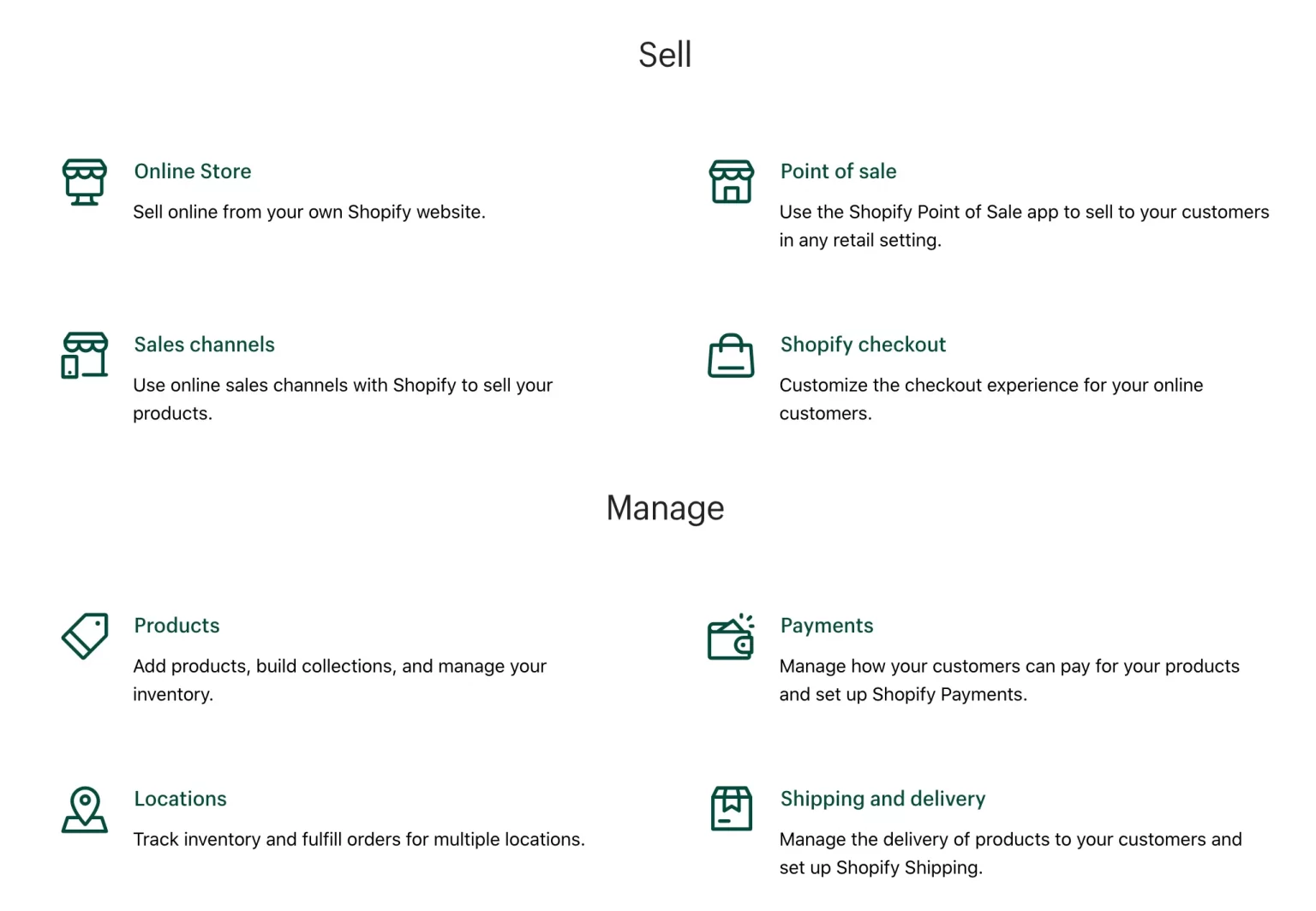
In the realm of customer support, Shopify leaves no stone unturned. The platform offers round-the-clock customer service through various channels, including phone and live chat, as well as email and social media support. There's also a forum with over 900,000 members ready to help with any queries or issues you may encounter, ensuring that you are never left feeling stranded.
One minor drawback is that to access the contact information for phone and email support, you need to first search for an answer in their help center. If you encounter an issue with a purchased theme, Shopify's support team might not always be able to assist directly, and you may need to reach out to the theme creator.
* GoDaddy Customer Support:
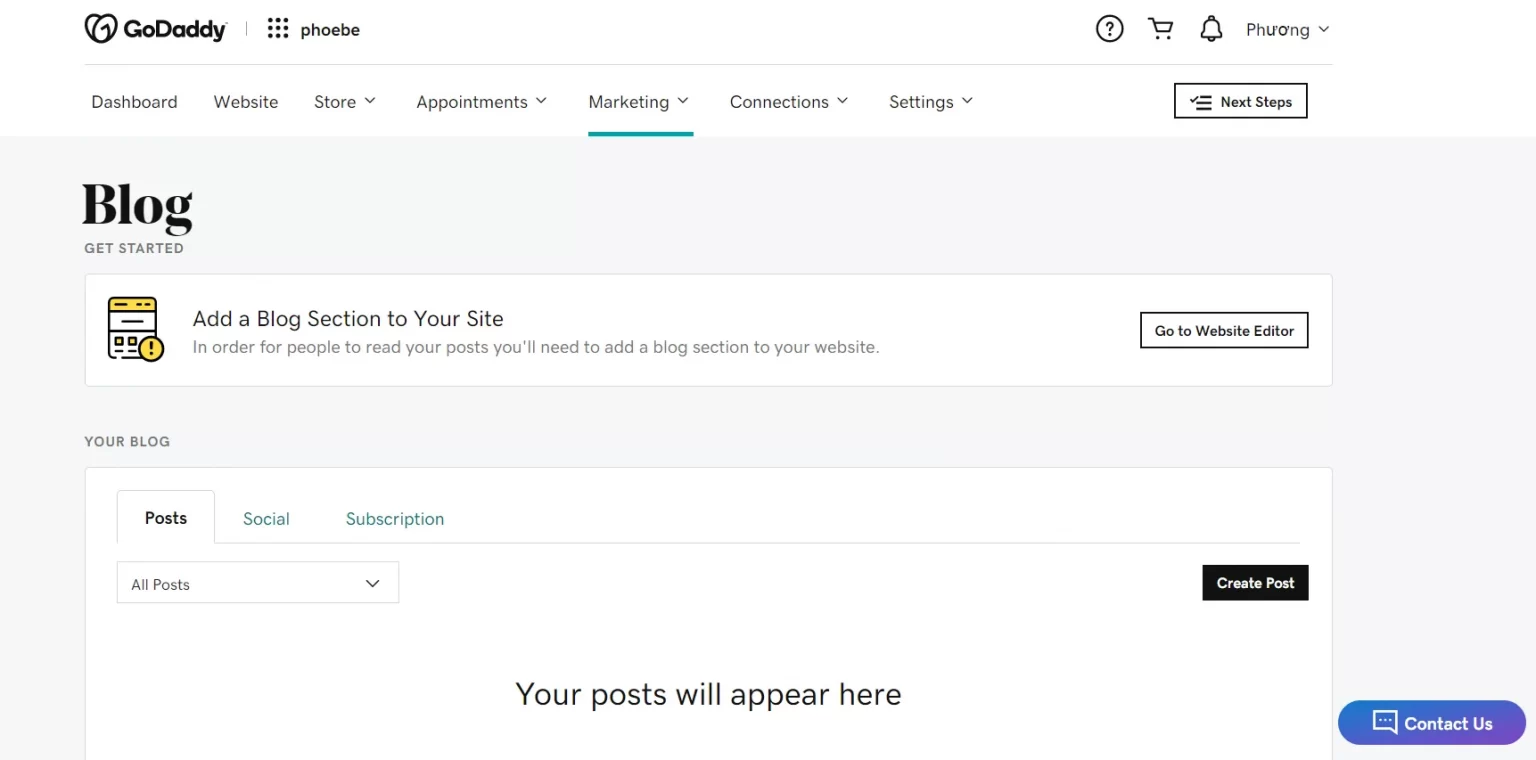
GoDaddy offers robust customer support as well. Their plans include live chat and phone support, with phone service available 24/7 in most regions and live chat offered round-the-clock universally. Their contact details are easy to find, being prominently listed under the 'Contact Us' section in the main menu. GoDaddy also maintains a Twitter account dedicated to customer support and provides a rich repository of help center articles and video tutorials.
A key advantage of GoDaddy is that their in-house support team typically provides direct assistance with issues related to their website templates. Consequently, in terms of direct contact and template-related support, GoDaddy may be considered more 'contactable'.
9. Internationalization
|
Internationalization Features |
Shopify |
GoDaddy |
|
Multilingual Support |
Offers translation in 50 languages and allows selling in 20 languages. |
Does not provide multilingual support. |
|
Domain Customization |
Allows domain ending with folder reference to language or country-level domains. |
No similar feature is available. |
|
Multi-currency Support |
Supports over 133 currencies and has an automatic conversion feature. |
Supports 18 currencies but only one can be displayed on the website at a time. |
|
Marketplace Integration |
No specific integrations with popular marketplaces. |
Integrates with major marketplaces like Amazon, Etsy, eBay, Facebook, Google Shopping, and Walmart. |
|
Automatic Tax Calculation |
Offers automated tax computation for users in the US, EU, UK, and Canada. |
Requires manual tax setup for each product. |
|
VAT MOSS for Digital Goods |
Uses 'Digital Downloads' tool for automated VAT MOSS calculation on digital items. |
Requires manual input for VAT MOSS rates for each EU country for digital goods. |
10. Security:
* Shopify Security:
Being a hosted platform, Shopify handles all updates and security concerns without requiring input from users. Shopify's systems are hosted on Level 1 PCI-certified servers, a necessity for processing credit and debit card information. Each Shopify store also benefits from 156-bit SSL encryption, which safeguards your customer's data.
Shopify provides merchants with Service Organization Control (SOC) and Transparency reports - independent assessments carried out by third-party auditors. As such, Shopify merchants are obligated to comply with independent guidelines that cover security and service availability criteria.
* GoDaddy Security:
GoDaddy's standard plans come equipped with basic security features including protection from fraud, viruses, and spam, as well as email privacy measures. However, merchants may have to purchase additional security plans if they need more comprehensive coverage, which can prove costly.
GoDaddy offers GoDaddy Website Security, a service that scans merchants' websites for potential security threats such as pharmaceutical hacks, redirect hacks, backdoor file hacks, Trojan viruses, and more. If the Website Security tool detects a problem, GoDaddy will promptly notify the store owners and provide subsequent steps to resolve the issue.
Moreover, GoDaddy Security also offers a Website Backup service. This enables merchants to backup their site and its associated database via FTP or SFTP to a secure cloud location. During the backup process, GoDaddy scans files for malware and stores the malware-free copies in secure storage. The backup process commences immediately once merchants set up their accounts.
Shopify vs GoDaddy: Which Should You Use?
The decision to use either Shopify or GoDaddy should be firmly rooted in the unique needs and growth patterns of your business. To facilitate an informed choice, we have prepared a detailed comparison table outlining the pros and cons of both Shopify and GoDaddy. Please consider this table as a resource to help align your decision with the platform best suited to support your business goals:
|
Shopify |
GoDaddy |
|
|
Pros |
- Specializes in e-commerce with a wide array of customization tools. - Numerous templates and ways to customize them. - Built-in payment processor and compatibility with over 100 payment providers. - Multiple plans dedicated to e-commerce. |
- Less expensive and simpler to set up an online store. - Easy sync with online marketplaces for greater brand exposure. - Mobile-optimized designs for a wider customer reach. - Strong customer service, beneficial for beginners. |
|
Cons |
- More expensive compared to GoDaddy. - Setting up the store can take longer due to numerous features. - Charges transaction fees if you choose to use payment methods other than Shopify Payments. |
- More difficult to customize and scale, less suitable for a robust online store. - More limited compared to Shopify. - Fewer payment processors to choose from. |
Pro tips: If you're looking to broaden your horizons beyond GoDaddy, explore the detailed analysis of Shopify vs competitors. This comparison provides a comprehensive overview of various e-commerce platforms, empowering you to make an informed decision tailored to your business needs.
FAQs
1. Which one is easier to use, GoDaddy or Shopify?
GoDaddy's standout attribute is undoubtedly its user-friendly interface, making it a breeze to navigate even for those who aren't tech-savvy. This simplicity is a significant advantage when it comes to ease of use, positioning GoDaddy as more accessible than Shopify, especially for beginners. However, this simplicity comes with a caveat. GoDaddy falls short on the features front, offering fewer functionalities compared to Shopify. This limited feature set, while making for a clutter-free interface, might prove restrictive for businesses aiming for a more comprehensive e-commerce experience.
2. Can I connect my GoDaddy domain with Shopify?
Absolutely, you can. Shopify allows you to link your online store with a domain you've obtained from a third-party provider like GoDaddy. Once this connection has been established, your customers can easily access your online storefront by simply entering the domain name into their web browser's URL field.
3. Do Shopify and GoDaddy offer free trials?
GoDaddy stands out with its 30-day free trial offer, one of the most generous in the market. On the other hand, Shopify provides a shorter trial period of just 3 days. However, they sweeten the deal with a special offer where you can explore their robust set of features for just $1 per month for the first three months on their Basic plan. This enables you to fully evaluate Shopify's capabilities without digging too deep into your pocket.
Read more: Shopify Free 14 days, 30 days, 90 days, 120 days Trial:
4. Does Shopify provide SSL certificates?
Shopify ensures stringent security for all its hosted websites by providing Secure Sockets Layer (SSL) protection as standard when you connect your domain. This means that every transaction, every piece of personal information shared by your customers, stays safe and private, helping you build trust with your audience. But that's not all - the benefits of SSL extend beyond security. Google and other search engines favor websites with SSL protection, so having this certificate can also boost your website's search engine ranking, potentially driving more organic traffic to your store.
5. Which platform has a better app market?
Shopify stands tall in the e-commerce landscape with one of the most vibrant app marketplaces among all platforms. This virtual hub allows you to effortlessly explore and install plugins spanning virtually all aspects of e-commerce, providing a robust toolkit to fortify your online store. Conversely, GoDaddy lacks this feature entirely, as it doesn't offer an app market. This presents a stark contrast between the two platforms in terms of extensibility and customization.
Final Thoughts
Ultimately, your selection should align with your eCommerce needs, goals, and desired level of customization. Both platforms have their unique strengths and are capable of supporting a successful online store. By understanding your business needs, you'll be able to choose the right platform, be it Shopify's advanced eCommerce functionalities or GoDaddy's straightforward and swift setup process.
We hope that this thorough comparison of Shopify and GoDaddy has been insightful and aids you in making a well-informed decision. If you have any questions, contact us via the4.co.
🎁 Exclusive Deals for The4 Customers

EcomRise Post Purchase Upsell
EcomRise Post Purchase Upsell helps merchants boost revenue by offering targeted upsell and cross-sell offers after checkout.
- ✅ Show post purchase upsell offers immediately after checkout
- ✅ Display thank you page upsell offer with discount
- ✅ Track upsell performance easily with GA4 integration

🎉 EComposer – Free 6-Month Plan
Build landing pages, sales funnels, and more with drag & drop.
The4 users get 6 months free (save $114).
- ✅ 100+ templates ready to use
- ✅ Build any Shopify page
- ✅ No coding required














No comments